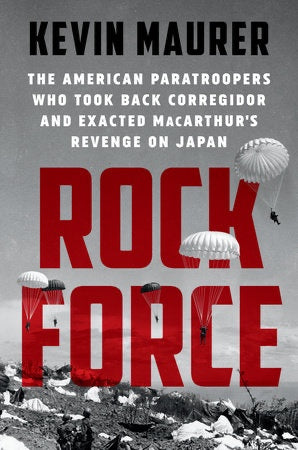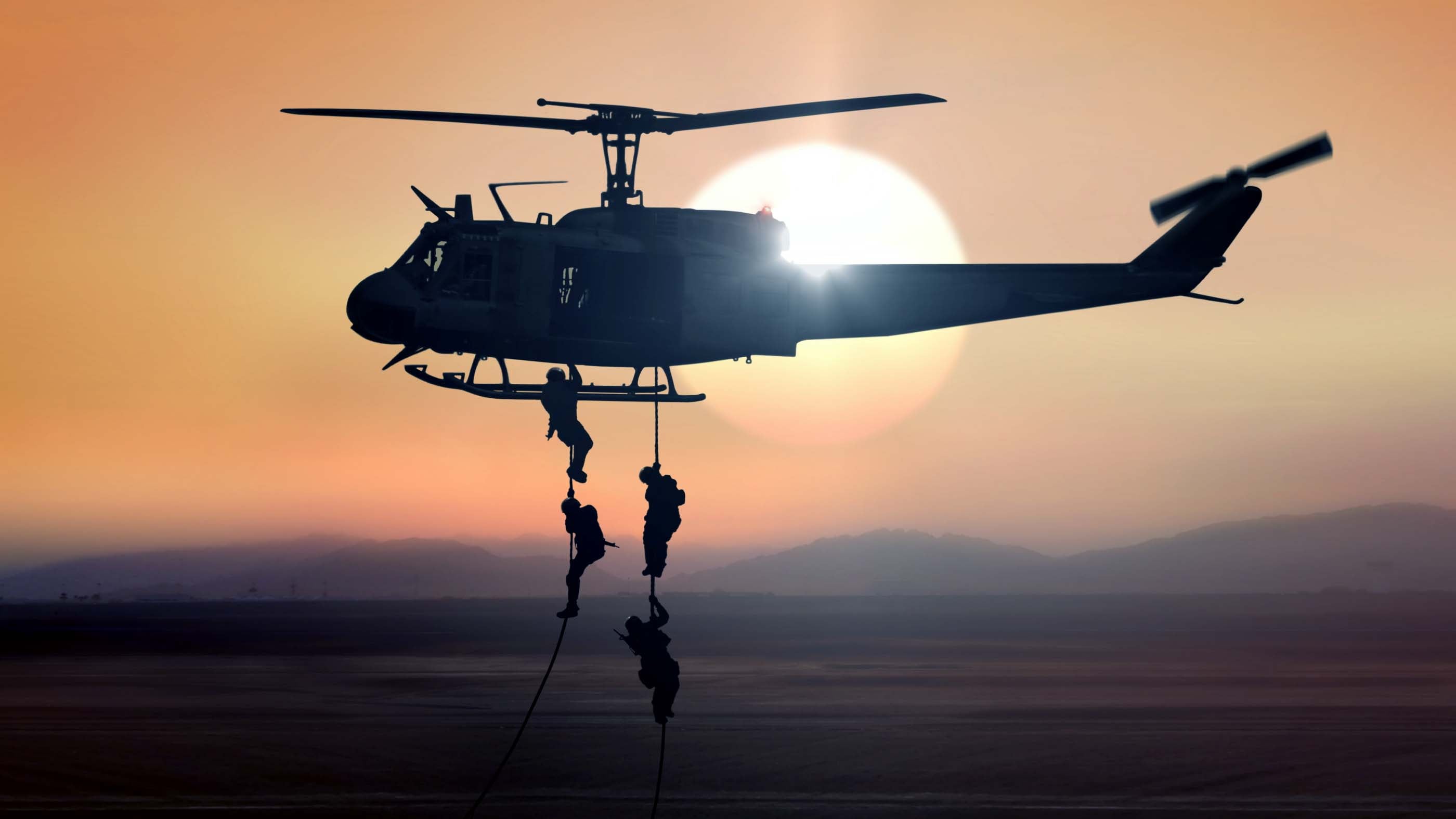I am never shy about telling the “surfers, hippies, hipsters and snowflakes” of SOFlete what I think you ought to be buying for yourself and others. I try to write at least one “Five Books You need To Read Now” article a year. I can usually be relied upon to provide Christmas recommendations that don’t suck for SOFlete adherents in any economic situation. Thanks to those efforts, I sometimes get asked to read a book before it comes out, which is cool for someone who spends roughly 87% of the household budget on books. One of those books, one I think the SOFlete community will enjoy, is coming in December 2020 from author Kevin Maurer, just in time for Christmas: ROCK FORCE: The American Paratroopers Who Took Back Corregidor and Exacted MacArthur's Revenge on Japan.

Kevin Maurer, a long-time journalist who embedded with, and wrote books about, the 82nd Airborne Division during the invasion of Iraq in 2003 and a Special Forces ODA in Afghanistan in 2010, is no stranger to military stories having researched and written a host of other SOF related books as well as co-authoring the New York Times bestsellers No Easy Day and American Radical. Maurer has a clear and thorough understanding of our world, allowing him to translate complex military concepts into ideas anyone can grasp. In Rock Force, he recounts historical detail exceptionally well while writing at the pace of an adventure novel. In fact, Rock Force reminded me of my first static line parachute jump: a quick take off and rush to altitude, the call to stand up and hook up, and then the train starts moving towards the door and you are stepping out into the blast and HOOOOOOLY SHIT THIS IS HAPPENING! That pacing makes this a GREAT gift for your Dad who may or may not get the intricacies of an airborne assault but loves a fast-moving adventure where the good guys win. It’s equally appropriate for the service member in your life looking for tactical lessons.
December 1941 means more than Pearl Harbor Day in the Philippines. The Japanese invaded, forcing General Douglas MacArthur to escape Bataan to a US Army base on the small island of Corregidor. A few months later, he further evacuated to Australia in a PT boat, swearing, “I shall Return!” The forces he left behind fought till they had nothing left to fight with, resulting in their surrender to the Japanese and the Bataan Death March, a 65-mile ordeal marked by stunning atrocity.
Four years later, McArthur made good on his promise to return to the Philippines. Corregidor figured heavily. The rocky island sits at the mouth of Manila Bay making it of tactical value. But its seizure represented the critical fulfillment of McArthur’s promise to the troops he left behind to return, liberate them, and seize victory, thereby reclaiming his honor and that of the nation.

The seizure of Corregidor came in the form of a simultaneous airborne and amphibious assault. Maurer focuses almost entirely on the airborne component. As a Marine, I love to remind my Airborne brothers and sisters about the paucity of true demand for mass tactical jumps since World War Two. They always say something stupid and irrelevant about similarly slim numbers of opposed amphibious assaults since 1953 or some garbage about Normandy and I put my hands over my ears and shriek loudly and declare victory. Even though I am obviously right, and even though there was an amphibious aspect of the fight for Corregidor, I can’t deny a daring “jump directly into the face of the enemy” story is squarely in the greatest Airborne tradition of paratroopers finding a superior enemy force, jumping into its midst, and fighting their way out.
The paratroopers of the 503rd Parachute Infantry Regiment (PIR) faced 6,700 Japanese soldiers, sailors, and marines, resigned to death for their Emperor. The Japanese were not the only challenge the 503rd PIR faced. The island was only five square miles in size. More difficult still, their hilltop drop zone was tiny, sitting atop cliffs falling away to the ocean, and covered by bomb craters and trees turned into spikes by thousands of tons of explosive pre-assault fires. I’ve landed on airfields with obstacles in peace time jumps. I’ve seen people drift off into the trees bounding massive, bulldozed DZs. Jumping on to a tiny, defended hilltop required a kind of fortitude I’ve frankly never had demanded of me.
But more than the broad tactical requirements of the fight, Maurer acquaints the reader with actual living, breathing soldiers who feel fear and pain and pride; men who stand up and walk around and bleed on the page. Maurer writes in a way that makes one want to skip ahead to make sure soldiers come through their specific trials alright, using interviews and first-person source material to pump blood and oxygen into the leap from C-47s under fire, close quarters firefights in jungle ravines and bunkered tunnels, and the kind of decisions leaders must make under ten days of constant fire from a force sworn to die in place.
Less dramatically, but perhaps even more affectingly, Maurer’s writing really shines in his descriptions of the moments between fire,
“Over the last five days, Captain Bradford had noticed the paratroopers had grown accustomed to facing death. The loss of a friend to enemy fire no longer rattled a man the way it had the morning they dropped onto Corregidor. Nothing illustrated the point better than the story of a skirmish near Monkey Point, which sat on the south side of the island’s tail. Bradford heard that a company there had come under sniper fire and managed to pinpoint the shooter’s location, peppering him with gunfire and grenades. They assumed the sniper was finished off. But an hour later, as the men rested nearby, a shot rang out, and Sgt. Andrew Maricic dropped dead behind a bunch of sandbags, a bullet hole in his head.
None of the men around him showed much emotion. They had trained with him, bunked with him, jumped with him, and fought beside him. But to evacuate his body would mean putting their own lives at risk. The sniper was still lurking somewhere, and others could be nearby. The platoon sergeant ordered his men to move out. They took Maricic’s Thompson submachine gun, his ammo, and a pair of grenades.
Maricic was left behind to lie dead under the tropical sun.
A week later, Bradford ran into one of Maricic’s friends at the aid station. He’d heard about Maricic’s death and told him what a fine man he was.
“Yes,” the soldier replied, “and you know, I can’t get over us leaving him behind. Of course, we had to, but sometimes at night now, right when I’m sleeping, he comes to me as real as life, complaining that I’d left him behind with the Japs. Even when I wake up, his voice is in my mind just like we’d been talking together, but of course it goes away. Then I light a cigarette and smoke it out, and go to sleep again.”
To the outside world, it looked heartless. But Bradford knew it was something else.
‘Death had become a familiar member of this and every other squad,” he wrote later. “There was no time for sentiment.’”
Only once have I ever felt even an iota of that kind of resignation. I remember staring at millions of stars in a desert sky, thinking they were the only thing I still shared with Americans other than those in the fighting holes arrayed around me, and wondering if one or more of us would not be there to look upon them the next night. To claim more insight into the thoughts of the men of the 503rd PIR than that afforded me by Iraqi stars would be melodrama and, worse yet, a disservice to the men who fought on that tiny, rocky battleground called Corregidor. But I gained enough over that night and a few others that I recognize Kevin Maurer has carried their reality across generations and made it present for us now. After nineteen years of a war of which America seems to have become largely unaware of that seems reason enough to read Rock Force.





Leave a comment
This site is protected by hCaptcha and the hCaptcha Privacy Policy and Terms of Service apply.